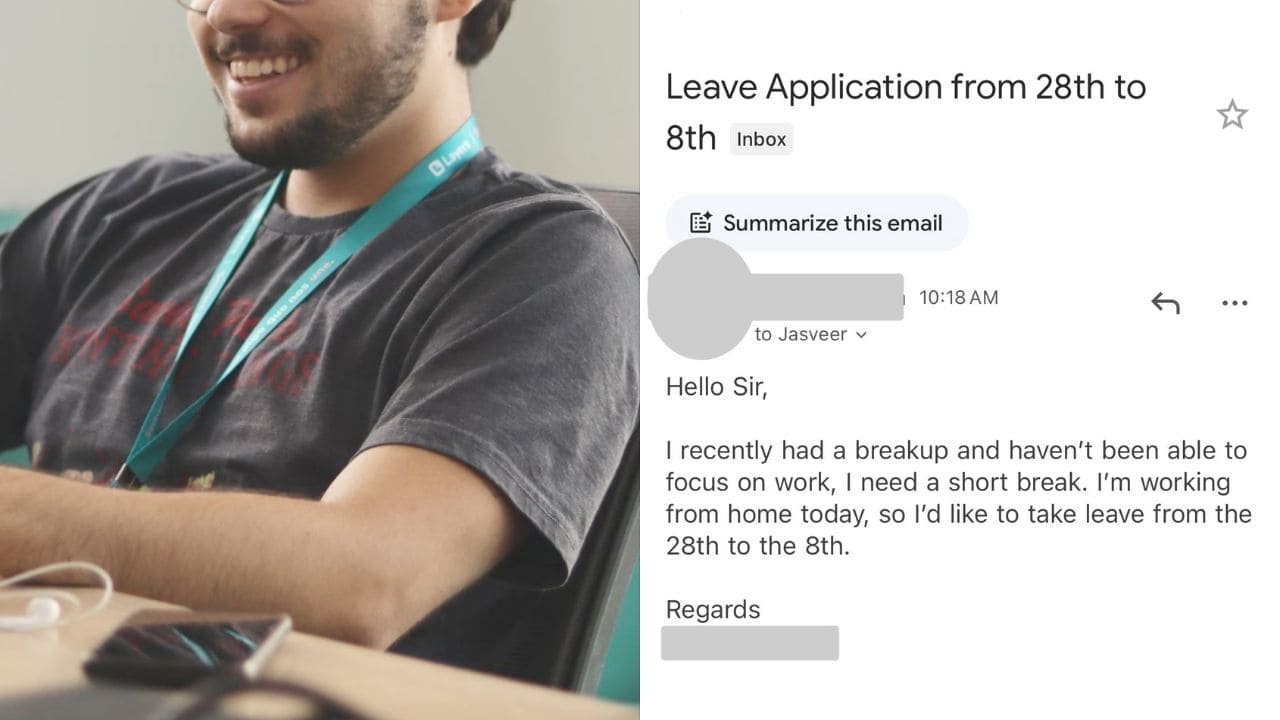In a world where office leave requests usually come with polite excuses, one Gen Z employee decided to tell it as it is. A breakup, a broken heart, and a simple email asking for 10 days off — that’s all it took to make the internet go crazy. Gurgaon-based CEO Jasveer Singh, co-founder of Knot Dating, approved the leave and shared the story online. The result? Millions of people connected with the honesty and humanity behind this unusual workplace moment.
The Honest Leave Request That Went Viral
On October 28, a young employee from Knot Dating sent an email that read:
“Hello sir, I recently had a breakup and I haven’t been able to focus on work. Need a short break. I’m working from home today, so I’d like to take leave from the 28th to the 8th.”
No fake excuses, no “personal reasons” — just honesty. The request reflected how Gen Z workers are open about their emotions and mental health struggles, even in professional spaces. The email was soon approved, but what made headlines was how the CEO responded.
CEO Jasveer Singh’s Reaction: Approval with a Smile
Instead of ignoring or rejecting the request, CEO Jasveer Singh saw it differently. He appreciated the honesty and even posted a screenshot on X (formerly Twitter) with the caption:
“Got the most honest leave application yesterday. Gen Z doesn’t do filters!”
Within hours, the post went viral, gathering over 6 million views, 121K likes, and hundreds of comments. People called it refreshing, relatable, and proof that the workplace is slowly changing. Singh’s response wasn’t just about approving a leave — it was about respecting emotions and mental health.
Why the Internet Loved It
The viral story caught attention because it showed a softer side of corporate culture. People loved how the CEO treated the situation with empathy instead of judgment. Social media users flooded the post with support, calling it “the most real thing” they’ve seen in 2025.
Several media houses, including NDTV, India Today, and Moneycontrol, picked up the story. Memes, reels, and reactions quickly spread, and hashtags like #BreakupLeave, #GenZAtWork, and #WorkplaceEmpathy began trending.
A New Kind of Workplace Culture
This incident highlights a major shift in modern workplaces. Gen Z employees value mental well-being as much as performance. They prefer transparency over pretence, and they’re not afraid to speak about emotional struggles.
In India’s growing startup culture, CEOs like Jasveer Singh are setting a new example — that being kind and understanding doesn’t make a company weak; it makes it human. Some experts say this could even inspire companies to create “emotional recovery leaves” or policies that acknowledge the mental health side of life’s challenges.
The Debate: Empathy or Over-Comfort?
While many praised the CEO’s gesture, not everyone agreed. Some older professionals felt this was “too casual” and that emotions shouldn’t affect work. This opened a larger discussion about generational differences in workplace values.
However, supporters argue that emotional honesty can improve productivity in the long run. After all, a short break to heal might prevent burnout later.
Impact Beyond One Email
The “Breakup Leave” story is more than a viral post — it’s a reflection of how Indian workplaces are evolving. Employees today want leaders who listen, understand, and respect their personal struggles.
Jasveer Singh’s open-minded response might inspire other companies to rethink their HR policies. It’s a reminder that empathy is not just good PR; it’s good leadership.
Conclusion
The story of CEO Jasveer Singh approving a breakup leave shows how honesty and humanity can redefine work culture. In 2025, as Gen Z continues to influence workplaces, mental health and emotional transparency are becoming essential parts of the conversation. A simple “yes” from a CEO turned into a global discussion on empathy — proving that sometimes, the most powerful leadership move is compassion.
FAQs
What is the “Breakup Leave 2025” story?
It’s about a Gen Z employee who openly requested 10 days off after a breakup. The CEO of Knot Dating, Jasveer Singh, approved it and shared the story online.
Why did this story go viral?
People connected with the honesty and emotional openness of the employee and appreciated the CEO’s empathetic reaction.
What does this mean for workplace culture?
It shows that companies are becoming more open to mental health discussions and that empathy is now an important part of leadership.
Did the company make breakup leave official?
As of now, no official policy has been announced, but the story has inspired many companies to rethink their approach to emotional well-being.
What was the public reaction?
The internet loved the story — it was widely shared, with many praising the CEO for understanding and kindness. Some, however, criticized it as “too soft.”

